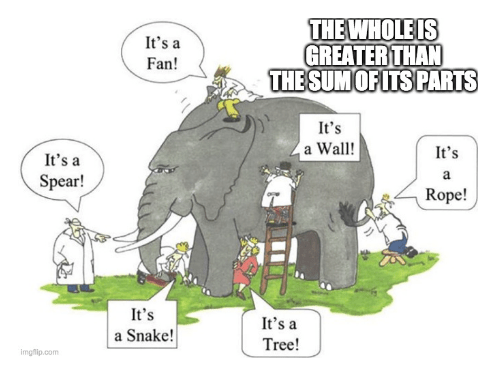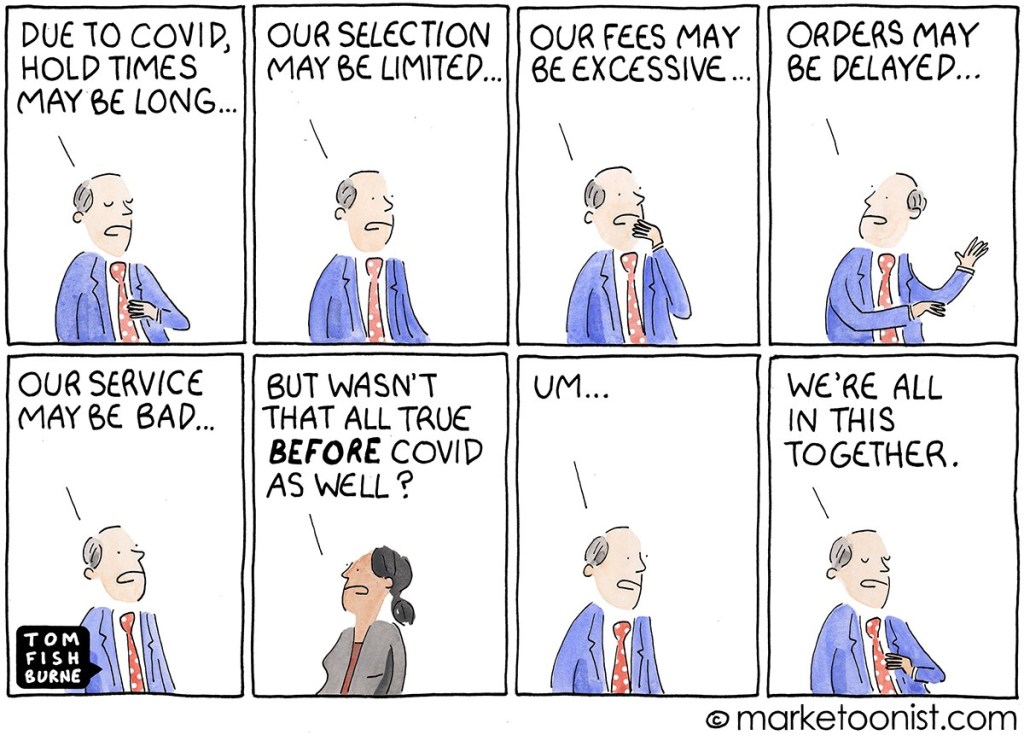We all know the phrase: “Keep it simple, stupid.” And while it may be a bit tongue in cheek, it certainly is wise advice.
A simple, straightforward plan is ideal because the execution is easier and more effective. Business can keep it simple. In a perfect world, we’d only have to deal with uncomplicated analysis like chart number one in the picture below. However, the reality is that business is usually more dynamic and so our results are more similar to chart number two.

Small business has a real opportunity to succeed by working as an integrated unit but maintain its simple focus for each component. For example, sales, operations, and marketing can be more integrated and responsible. Think about restaurants where the presence of the owner makes the dining experience great compared to various chains where consistency may exist, but so does mediocrity. My neighborhood service station has saved me lots of money over the years by ensuring I use warranties when available and not insisting on unnecessary repairs. Business can keep it simple. In a small business, managers are generally empowered to solve problems without trying to get around endless rules from out of touch management who isn’t there to see the day to day. Small businesses have the ability to develop operations that are unique and tailored to what works best for their particular company.
The pandemic is a great example of the juxtaposition of being simple and dynamic. reality. The year 2020 was dramatically disrupted by technological growth, political change, and new methods (like working from home). I’m sure most people’s plans for last year turned out more like chart number two above. And now, planning for 2021 is going to be quite dynamic and complex seeing that we have less history to use as a basis for comparison and there are several new elements to consider. Not to mention, the impact is far different in our “k” economy, which affects the rich and poor differently. Specifically, the top ten billionaires made hundreds of billions last year while there are 10s of millions of poor people unemployed, without food, homeless, and lacking other resources to live a comfortable life. As a result, anyone who doesn’t have ample money to spare will now have an even greater disadvantage in planning ahead.
In their attempts to stay relevant, many organizations stress innovation, new products, and creativity. However, that process downplays two important rules:
- The chain is only as strong as the weakest link.
- The whole is more than the sum of the parts.
Never has this been more evident than in the roll out of the COVID-19 vaccine. Much of the focus was on the heroic development and production of millions of vaccinations per month. However, we learned that distribution, management, testing, vaccination locations, populating education, supplies, getting trained people to vaccinate etc. can disrupt the final goal of getting the shots in peoples’ arms.

Another example of dynamic interaction with simple steps is type 2 diabetes. There are many factors in managing it: diet, exercise, medication, heredity, or life situation. You can’t just focus on one of these things, however, it’s really about the interaction of all of the above. And, depending on the person, the approach will be different and specific based on their needs and circumstances.
Basically: Success comes from many moving parts—not a single action or idea.
Let’s now consider customer service. I believe this is an area where small business can excel by focusing on the whole and integrating services. Business can keep it simple. How many times have you called customer service and dealt with someone who barely speaks English, refuses to connect you to a supervisor, lists irrelevant rules, or has no authority to do anything except say no? In contrast, many small businesses empower agents to solve problems, employ adequate supervisors, have general guidelines rather than specific rules, and actually care about satisfying customers. I don’t have to tell you which approach is more successful.

In his book Innovation Stack, Jim McKelvey discusses the combination of factors that go into the success of many entrepreneurial companies. For example, many bigger airlines tried to copy some of Southwest Airlines features to compete with them. However, they failed to recognize the total package of operations, pricing, service, morale, communications, and (most important) culture in developing the Southwest package.
Our complex society also requires that we pay more attention to certain issues that can be devastating to success, potential opportunities, or public opinion of your business. Many large companies give lip service to these issues, but, in practice, minimize their commitment. For example, how many times will sexual harassment occur at CBS or in countless other areas of the entertainment industry before it is truly recognized and dealt with effectively? Other important issues include safety, health, environment, and discrimination.
One of the biggest opportunities for success is to just simply be polite. Saying please, thank you, and sincerely inquiring how someone is can make a huge difference (to both employees and customers). Just look at Trader Joe’s. People love TJ’s because everyone who works there is always extremely helpful, kind, considerate, and genuinely seems happy to be working there. Their great customer service is just a part of a bigger, more complex strategy, which involves effective training, great pay, and benefits. Happy employees are most certainly an important part of a successful culture.
In addition to issues that we already deal with, we must also take into consideration the issues that don’t yet exist. These are usually a byproduct of dramatic social and technological change. Currently, some of the biggest disrupters are fin-tech and sharing sites/platforms like Uber, Airbnb, Zillow, Facebook, Venmo, PayPal, and Square. They’re creating the weakest links among big companies. These tech disrupters rely mostly on growth orientated programming to disrupt businesses. One of their big advantages is that they typically rely on little or no inventory, fixed assets, or expensive operations and overhead.

The Department of People waiting for Something to Happen…
Regarding market research, Steve Jobs noted, “Our job is to figure out what they’re going to want before they do. I think Henry Ford once said, ‘If I’d asked customers what they wanted, they would have told me, “A faster horse!” ‘People don’t know what they want until you show it to them.” Innovation and change are never-ending and constantly adapting to the “new norm” will always be a challenge that businesses face. Working from home and E-commerce are among the more significant changes that we’ve seen of late. G.M. also announced it will phase out fossil fuel cars in 10-15 years. These are great opportunities for small companies to develop new technologies while traditional suppliers continue to make the “buggy whips” of today.
Small businesses have an opportunity to capitalize on the disruption in our current economy. In particular, they need to test current practices and adapt to the new environment. This mostly involves testing ideas and being open to new concepts. It also requires a willingness to take more risk and recognize changing parameters such as technology, uncertainty, low interest rates, and inflation. Finally, it demands we understand and adapt to changes in culture, politics, risk, and communication. Business can keep it simple. We have a choice: Will we resist and be dragged along or will we jump at the opportunity to get ahead? The former is a simple approach; the latter is certainly more dynamic and, arguably, more rewarding.
Related: Bureaucracy No Longer Works


